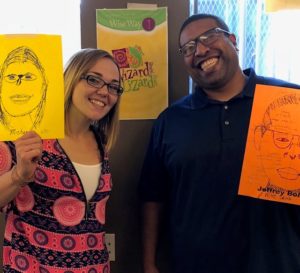More Kodiak Community Leaders Become BrainWise Instructors
Posted On: September 19, 2019The Kodiak Area Native Association (KANA) in Kodiak, Alaska, is a tribal organization that provides health and social services to the Koniak region, including the villages of Akhiok, Karluk, Old Harbor, Ouzinkei, Port Lions, and Larsen Bay. The youth and families in these rural communities face many personal and health challenges.
Matthew Kozak, KANA’s Prevention Grants Coordinator, grew up in Kodiak and says that “supporting kids in their efforts to make healthy, positive choices is something I have been interested and involved in since I was a high school student myself.” He said that KANA administrators chose BrainWise because of its successful results teaching critical thinking and decision-making skills with Alaska Natives and American Indians.
In 2015, KANA staff members were trained to teach BrainWise to participants in the Youth with a Vision Leadership program and Emerging Adults Class for young adults ages 18-24. In 2019, additional training was scheduled after Tori Frank was hired as the new Prevention Specialist for Youth and Adults. Tori wanted to learn BrainWise herself and saw the training as an opportunity to become involved and connected with community members from KANA’s multi-faceted programs as well as from schools, the local college, and public health.
With Matthew’s support, she organized training for 16 educators, counselors and health professionals who work with Kodiak’s youth and families. The training provided KANA staff with an opportunity to engage with community members and learn about their different perspectives for using BrainWise.
 Veteran BrainWise trainer Matt Sena and trainer Michaella Perez, both long-time educators in Alaska, conducted the two-day event in Kodiak. They used their knowledge of health, social, and political issues in rural Alaska Native communities to customize problem scenarios for the groups. Participants said the training helped them understand the 10 Wise Ways and showed them how they could integrate them into existing materials and create culturally sensitive lessons and activities that address specific needs of the various populations.
Veteran BrainWise trainer Matt Sena and trainer Michaella Perez, both long-time educators in Alaska, conducted the two-day event in Kodiak. They used their knowledge of health, social, and political issues in rural Alaska Native communities to customize problem scenarios for the groups. Participants said the training helped them understand the 10 Wise Ways and showed them how they could integrate them into existing materials and create culturally sensitive lessons and activities that address specific needs of the various populations.
Tori said the training opened up conversations about using the program in the different agencies, including discussions about how instructors would teach and reinforce the wise ways. An example would be Never Alone, an interactive video game co-created by the Alaska Native Community in partnership with a media company